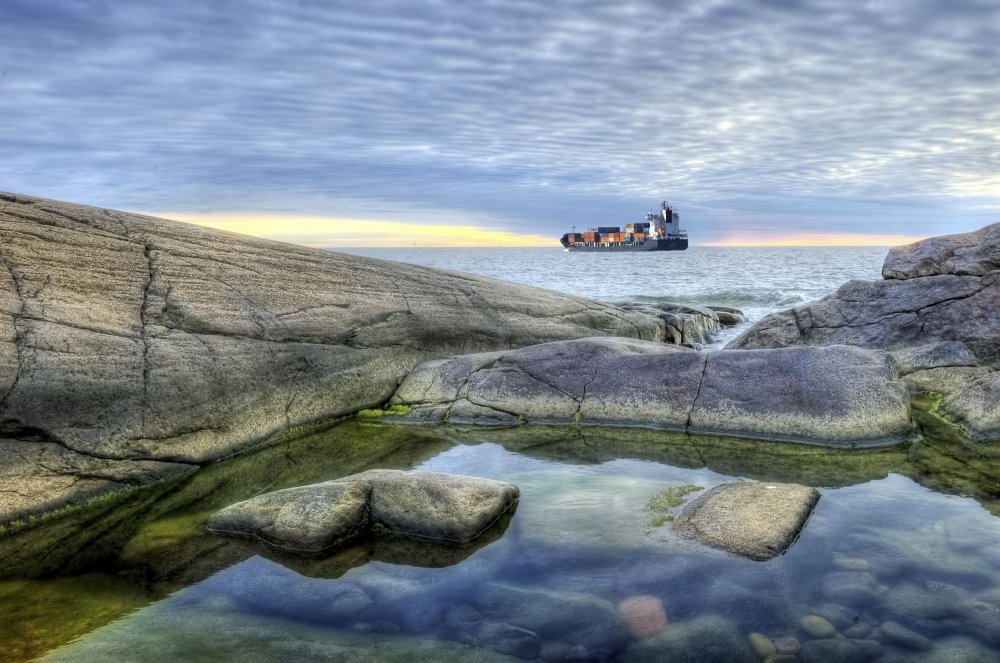PA Ship
News
PA Ship workshop on Operational Steps to Establish Green Shipping Corridors as a Way to Achieve Zero-Carbon Shipping in Berlin - 8 June 2023
Workshop: Operational Steps to Establish Green Shipping Corridors as a Way to Achieve Zero-Carbon Shipping
The EU Strategy for the Baltic Sea Region (EUSBSR) Policy Area (PA) Ship organized a workshop on operational steps to establish green shipping corridors as a way to achieve zero-carbon shipping. The workshop was hosted by the German Federal Ministry of Transport and Digital Infrastructure of Germany and organized as back-to-back with the Germany’s Presidency of the Council of Baltic Sea States (CBSS) Expert Group on Sustainable Maritime Economy meeting.
The workshop gathered ca. 40 participants representing shipping line companies, ferry operators, shipbuilding industry representatives, port authorities and operators, academic institutes, authorities and policymakers, and NGOs from different countries across the Baltic Sea, Nordics and other parts of the Europe.
The key messages of the workshop
- Collaborative Approach: Collaboration between stakeholders, including governments, private sector companies, and different industry sectors, is crucial for successfully establishing green shipping corridors.
- Financial Risk-Sharing: Sharing the financial risks associated with the establishment of green corridors among stakeholders is essential to ensure their viability and sustainability.
- Incentives and Support: Incentives, such as supportive policies, funding opportunities, and regulatory frameworks, are necessary to accelerate the transition to zero-carbon shipping and encourage industry participation.
- Technological Advancements: Embracing innovative technologies and addressing challenges related to alternative fuels, bunkering infrastructure, and safety requirements are critical for the successful implementation of green shipping corridors.
- Global Collaboration: International coordination and knowledge-sharing among different countries and regions are important to create a unified approach and ensure harmonized implementation of green shipping corridors worldwide.
The workshop began with two keynote speeches that provided valuable insights into the establishment of green shipping corridors. Mr. Björn Garberg from Swedish Transport Administration focused on the practical aspects of establishing green shipping corridors in the Baltic Sea region, emphasizing dialogue with key stakeholders. He brought up the key findings, which were the need for short- and long-term perspectives when planning green corridors, financial risk-sharing among actors, the necessity of incentives, and the importance of prioritization and early movers in the shipping sector. Ms. Eirill Bachmann Mehammer from DNV introduced the Nordic Roadmap project, aiming for zero-emission shipping. Pre-piloting steps for green corridors were outlined, along with identified barriers like costs and fuel availability. They have short-listed 6 promising green corridors, including 3 in the Baltic Sea region. To overcome the identified barriers, they have suggested actions including cost- and risk-sharing mechanisms, procurement policies, green financing, and the creation of a common Nordic playground for unified approaches and standardized emission accountability.
The panel discussion was moderated by the Mr. Eero Hokkanen from the Finnish Ministry of Transport and Communications. The valued panel of experts were:
- Sofie Fogstad Vold from Ministry of Climate and Environment, Norway
- Magnus Gustafsson from Åbo Akademi University, Finland
- Stefan Breitenbach from the Port of Hamburg, Germany
- Andrius Sutnikas from the Klaipeda Science and Technology Park, Lithuania
- Jan Jarmakowski from the Gdynia Container Terminal S.A., Poland
The panel discussion allowed participants to engage in a fruitful exchange of ideas and perspectives. The panellists emphasized the need for collaboration between governments, private sector companies, and other stakeholders, with a particular emphasis on the inclusion of cargo owners in the discussion and planning processes. Cargo owners should be actively involved when planning to establish green corridors as they would bear some of the costs associated with establishing green corridors. During the panel discussion, participants raised concerns about the price gap of alternative fuels and the importance of filling that gap. They also highlighted the need for technological advancements related to LNG, ammonia, and batteries, and the importance of innovative new technology solutions. It was emphasized that the success of establishing green shipping corridors requires engagement not only from ship owners and port operators but also from the energy sector and other relevant industries.
The third part of the workshop introduced the European Union's perspective on green shipping corridors. First, Mr. Antoine Kedzierski from DG MOVE (Office of the TEN-T Coordinator for Motorways of the Sea) emphasized that the EU's maritime sector is a significant part of the European economy, as shipping accounts for 75 percent of the EU's external trade and about a third of internal trade. He discussed about the EU's regulatory measures and that the Fit for 55 package allows to tackle different aspects for the development of a marine fuel value chain (e.g., fuel production and supply, infrastructure, demand, taxation, carbon pricing). Thus, providing a framework to support the concept of green shipping corridors. He together with next presenter Ms. Marlene Riedel from the EUSBSR Baltic Sea Strategy Point, provided very throughout overview of the funding possibilities (e.g., Horizon Europe, Connecting Europe Facility, Innovation fund, Cohesion policy funds) when it comes to establishing these green shipping corridors. Both of the presenter highlighted that each need, project and idea are unique thus the correct funding instrument/program have to be found based on the individual needs. Ms. Riedel together with Ms. Mirka Laurila-Pant from the EUSBSR PA Ship provided information about the EUSBSR, its governance structure and how it works as a platform for cooperation and coordination among the Baltic Sea States. EUSBSR and especially the PA Ship can provide support in finding project partners in applying for financing for the projects, communicating results and in reaching out to policy level.
The workshop successfully brought together stakeholders from various sectors to discuss the operational steps required for establishing green shipping corridors. The workshop emphasised the importance of collaboration, open dialogue and innovative technologies to facilitate the establishment of green shipping corridors. There is a need for supportive policies, funding opportunities, and regulatory frameworks to create sustainable and efficient green shipping corridors in the Baltic Sea region and beyond.





